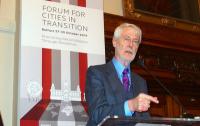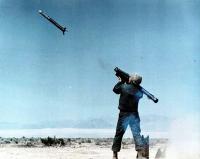-
Israel’ security agencies take gloves off in dealing with Jewish terrorists

The killing last summer of a Palestinian family by Jewish fanatics forced the Israeli security agencies to rethink their approach to the growing threat of violence posed by Jewish religious radicals. These religious extremists, raised in Israeli settlements built in the occupied Palestinian territories, are small in number, but they enjoy the tacit support of many settlers, and, as importantly, the blessings of a few extremist but influential rabbis. The Israeli security services have decided to take the gloves off, and subject Jewish extremists to enhanced interrogation techniques which, until now, have been used only on Palestinian terrorism suspects. The more robust interrogations have yielded important results.
-
-
World leaders urged to oppose encryption back doors
In an open letter made public on Monday, nearly 200 Internet and digital rights leaders and experts, companies, and organizations are calling on the Obama administration and other world leaders to reject efforts to create “back doors” to encryption. “Encryption tools, technologies, and services are essential to protect against harm and to shield our digital infrastructure and personal communications from unauthorized access,” the letter states.
-
-
ISIS instructs Western followers on how to avoid detection by police

ISIS is a sophisticated terrorist organization, as its savvy use of social media shows. Its sophistication shows in other ways as well: It has issued instructions to its followers in the West, who are plotting terrorist attacks against Western targets, advising them how to avoid detection by intelligence and law enforcement agencies.
-
-
ISIS follower shoots Philadelphia police officer
A man who shot a Philadelphia policeman while he was sitting in his squad car and wounded him, was inspired by ISIS. Edward Archer used a stolen gun to fire eleven shots at Jesse Hartnett in – but Hartman, despite being wounded, was able to get out of the car and return fire, hitting the gunman three times.
-
-
Religious beliefs may promote interfaith cooperation, rather than violence

From the Christian Crusades to the Paris attacks, countless conflicts and acts of violence have been claimed to be the result of differing religious beliefs. These faith-based opinions are thought to motivate aggressive behavior because of how they encourage group loyalty or spin ideologies that devalue the lives of non-believers. However, just published research reveals the opposite: religious beliefs might instead promote interfaith cooperation.
-
-
Administration tries to harness Silicon Valley’s talent for fight against ISIS

Senior administration intelligence officials are meeting today (Friday) with Silicon Valley’s major technology firms — companies including Facebook, Twitter, Apple, Microsoft, YouTube , LinkedIn, Dropbox, and others — in an effort to recruit them and their technological know-how in the fight against radicalization and terrorism.
-
-
New York City settles Muslim surveillance lawsuits

The NYPD has been agreed not to conduct surveillance based on religion, race, and ethnicity after charges that it had illegally monitoring Muslims in New York City. The city has agreed to settle two civil rights lawsuits for illegally monitoring its Muslim community following the September 11 attacks. As part of the settlement, in which the city does not admit to any wrongdoings, the city will appoint a civilian to monitor the NYPD’s counterterrorism unit.
-
-
Ryan examining congressional authorization of war against ISIS

House Speaker Paul Ryan (R-Wisconsin) has instructed the House majority leader and the chairman of the House Foreign Affairs Committee to begin discussions with House members about whether a measure which would authorize war against ISIS would be likely to be supported by a majority of House members. Senate majority leader Mitch McConnell (R-Kentucky), and many other Republicans in Congress, question the need for such a measure.
-
-
Adelson offered to pay for Iron Dome’s development

In 2013, shortly after Congress had passed a funding bill for the joint Pentagon-Israel Iron Dome missile defense system, Senator Harry Reid (D-Nevada), then the Senate’s majority leader, received a call from one of his constituents, the gambling billionaire Sheldon Adelson. Adelson asked Reid to convey to the White House a most unusual offer: He, Adelson, was willing personally to contribute $1 billion of his own money toward the development costs of Iron Dome.
-
-
It’s too late for a two-state solution in Israel-Palestine

Many obstacles stand in the way of a two-state solution to the conflict in Israel and Palestine. The current wave of violence has cemented additional layers of distrust of Palestinians to the ones Jewish Israelis already harbor. The hatred is calcifying. Reaching a two-state solution is essential: Within a few years there will be more Palestinians than Jews “between the River and the Sea,” and without a Palestinian state, Israel will either have to give the right to vote to Palestinians or become an apartheid state like South Africa once was. Demographic changes taking place within Israel’s Jewish population, however, may make the implementation of a two-state solution, if it is miraculously agreed to by the two sides, impossible to implement. The most important structural change is that Israel is steadily becoming more religious, which is leading to a decline in the overall level of education and economic productivity of the Israeli population. Allied to the increasing propensity to religiosity among Israeli Jews are trends in the composition of the Israel Defense Forces (IDF), a change that raises questions about the reliability of the army. The IDF is increasingly a religious army, recruited from the settler community in the West Bank. Best estimates are that if a two-state agreement is somehow reached, about 100,000 settlers would have to be evacuated from the West Bank under any such agreement. Could the IDF be relied upon to evacuate Jerusalem and West Bank settlements — as they did in Gaza in 2005 — with battalion commanders who are increasingly religious, and with religious soldiers who, in any event, are more likely to obey their rabbis’ instructions than their commanders’ orders? With every passing year, using the IDF to evacuate settlers from the West Bank will become more problematic, and evacuation less likely — which means that reaching, and implementing, a two-state solution is becoming less likely as well.
-
-
Gov. Brown declares emergency in wake of massive L.A. natural gas leak
California governor Jerry Brown on Wednesday declared an emergency in a Los Angeles neighborhood where a natural gas well has been spewing record amounts of stinking, global-warming methane gas. Energy experts said the breach at the natural gas storage reservoir, and the subsequent, ongoing release, are the largest known occurrence of its kind.
-
-
Bashar al-Assad likely still to be in power when Obama leaves office
The U.S. government has privately concluded that President Bashar Assad of Syria is likely still to be in power when Barack Obama leaves the White House in January 2017. The Telegraph reports that a timeline which was prepared for American officials and obtained by the AP says that the earliest possible date for the departure from power of Assad and Alawite inner circled would be March 2017.
-
-
Florida prof. claiming mass shootings were staged by the Obama administration is fired
James F. Tracy, a Florida Atlantic University professor conducting a public campaign on social media, in radio interviews, and op-ed articles claiming that that the 2012 massacre of children at Sandy Hook Elementary and other mass shootings were not more than hoaxes perpetrated by federal officials on instructions of the Obama administration in order to rally support for gun control, was fired Tuesday. Tracy has made a name for himself in the more rabid conspiracy circles for repeatedly calling into question the very truth behind recent mass shootings like the ones in Newtown, Connecticut, Charleston, South Carolina, Aurora, Colorado, and San Bernardino, California. Tracy, in his blog posts and radio interviews, claim that these shooting never took place – or, if they did, that they were mere “drills” carried out by “crisis actors” employed by the Obama administration.
-
-
ISIS can now use decommissioned shoulder-fired anti-aircraft missiles

Weapon experts say that ISIS engineers have developed advanced new weapon systems capable of shooting down passenger jets. Different terror groups have had access to these missiles since the 1970s, but experts note that storing such systems for long periods of time requires the development of thermal batteries to power the missiles when they are taken out of storage and into the field. Developing such batteries and maintaining them requires advanced knowledge.
-
-
Leader of anti-government Oregon group says God told him to act

Ammon Bundy, the leader of a group of anti-government militia which seized a government building in a remote wildlife refuge in Oregon to protest federal land policies, said he took his action after God told him to do so. Bundy comes from a Nevada Mormon family which has been challenging federal land policies for decades, most recently in 2014. The Bureau of Land Management (BLM) claims the Bundy family owes the government $1.1 million in fees for using public and, and in penalties for non-payment.
-
More headlines
The long view
Factories First: Winning the Drone War Before It Starts
Wars are won by factories before they are won on the battlefield,Martin C. Feldmann writes, noting that the United States lacks the manufacturing depth for the coming drone age. Rectifying this situation “will take far more than procurement tweaks,” Feldmann writes. “It demands a national-level, wartime-scale industrial mobilization.”
No Nation Is an Island: The Dangers of Modern U.S. Isolationism
The resurgence of isolationist sentiment in American politics is understandable but misguided. While the desire to refocus on domestic renewal is justified, retreating from the world will not bring the security, prosperity, or sovereignty that its proponents promise. On the contrary, it invites instability, diminishes U.S. influence, and erodes the democratic order the U.S. helped forge.
Fragmented by Design: USAID’s Dismantling and the Future of American Foreign Aid
The Trump administration launched an aggressive restructuring of U.S. foreign aid, effectively dismantling the United States Agency for International Development (USAID). The humanitarian and geopolitical fallout of the demise of USAID includes shuttered clinics, destroyed food aid, and China’s growing influence in the global south. This new era of American soft power will determine how, and whether, the U.S. continues to lead in global development.
Water Wars: A Historic Agreement Between Mexico and US Is Ramping Up Border Tension
By Natasha Lindstaedt
As climate change drives rising temperatures and changes in rainfall, Mexico and the US are in the middle of a conflict over water, putting an additional strain on their relationship. Partly due to constant droughts, Mexico has struggled to maintain its water deliveries for much of the last 25 years, deliveries to which it is obligated by a 1944 water-sharing agreement between the two countries.
How Disastrous Was the Trump-Putin Meeting?
In Alaska, Trump got played by Putin. Therefore, Steven Pifer writes, the European leaders and Zelensky have to “diplomatically offer suggestions to walk Trump back from a position that he does not appear to understand would be bad for Ukraine, bad for Europe, and bad for American interests. And they have to do so without setting off an explosion that could disrupt U.S.-Ukrainian and U.S.-European relations—all to the delight of Putin and the Kremlin.”
How Male Grievance Fuels Radicalization and Extremist Violence
By Haily Tran
Social extremism is evolving in reach and form. While traditional racial supremacy ideologies remain, contemporary movements are now often fueled by something more personal and emotionally resonant: male grievance.
